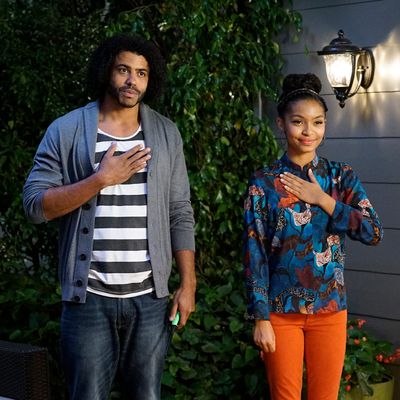
Finally, Dre decides to try therapy. It’s been a long time coming, between his frequent bursts of anger and hiding food around the house for emotional eating. I’ve long had issues with the way he talks to Junior, and while that doesn’t get addressed directly, I’m glad he sought help in “Good Dre Hunting.”
Unsurprisingly, Dre subscribes to the notion that black people don’t need therapy. He and Ruby laugh at Bow for going. Dre thinks it’s enough and admirable that black people turn the pain of living in America into jazz and macaroni and cheese, and that the only people who need help are privileged folks with champagne problems. Bow’s problems are real, though. Her colleague, Dr. Gabler, constantly belittles her position, referring to her as Nurse Moonbeam, and calls her pet names while he interrupts her so he can scrub in. For Bow, therapy helps her better understand why she doesn’t stick up for herself more often — she’s a people pleaser and it leaves her miserable.
It seems like everybody in this episode is dealing with anger issues. First, Ruby breaks a vase after a bible study member brings day-old coffee cake, and Curtis, the intern at work, threatens to kill Santiago, the custodial worker, because he keeps looking at him. Dre then snaps on a delivery man and realizes he does have an anger problem. He takes over Bow’s therapy sessions, but spends the first 35 minutes talking about his shoes before the therapist gets him to reveal he enjoys making people laugh because they’re laughing, not fighting. And if they’re not fighting, they’ll remember to take care of him, a lingering fear from his childhood. When the therapist suggests Dre took on a lot of responsibility to keep his family stable, it breaks him down.
It’s important to acknowledge how resistant some black people can be about therapy. Black-ish does a good job of covering the idea that skeptics think therapy just for serious mental illness, and not for people who need help handling everyday stress. However, I think the episode could’ve dug into the cultural distances between black patients and white therapists. Can a black, working-class patient feel comfortable talking about the racist microaggressions at her job with a white therapist? If the therapist isn’t familiar with such an experience, how can he or she provide effective coping mechanisms?
Also, I loved the way the episode points out how sensitive some black people can be to staring. This was a good moment for historical context, although there was no educational cutaway this time. During slavery, the Jim Crow era, and well into the civil-rights movement, black people were not allowed to look white people in the face. If they did, it was perceived as a threat, as them trying to rise above their station in life, so they were attacked or punished for eye contact. The racism of America has long-lasting effects and some have been internalized, leading something as innocuous as eye contact to become weaponized.
After weeks of therapy, Dre works through his need to threaten everyone who looks at him too hard. His new mantra? “Don’t attack; take a step back.” At his job, he puts that coping advice to the test when he doesn’t go off on Connor for not preparing for a pitch, for his ALL LIVES MATTER tattoo, or for making more than Dre does when he’s only been at the company for three months. It takes a lot of effort for Dre to not get angry, and he winds up crying in the closet later that day. Bow discovers him there when she tries to cry in secret after finally snapping on her sexist co-worker. He tried to push her out of the way again to scrub in, but she flew into a rage, throwing soap, gloves, and the towel dispenser. It was so unlike her that she asks Dre to give back her therapy sessions.
Dre agrees. He likes the tools the therapist gave him to cope with his anger (and emotional eating), especially since Mr. Stevens was so impressed with Dre’s cool that he and Connor now make the same amount. However, Dre feels he needs his anger in order to get justice and ensure that people fully understand where he’s coming from. Both Bow and Dre agree they need to balance therapy with finding their own ways of coping with life’s stresses.
Meanwhile, Johan has been a life coach for Junior and Zoey, but it turns out he has a life coach of his own — and it’s all a pyramid scheme. When the twins overheard Bow tell Dre to go to therapy, they assumed divorce was imminent and tried to figure out who they’d live with. Once it became clear their parents were staying together, it crushed their dreams of having the Rock as stepfather. Keep dreaming, kids.
I hope that means the Rock will make a guest appearance one day. That would be awesome. More importantly, I’m glad Black-ish acknowledged the value of therapy, while recognizing it doesn’t always work in the same way for everyone. People have individual needs, so they must each figure out the best way to use resources like therapists and life coaches. Hopefully, “Good Dre Hunting” will help to break down stereotypes about therapy and lead people to seek the help they need.




